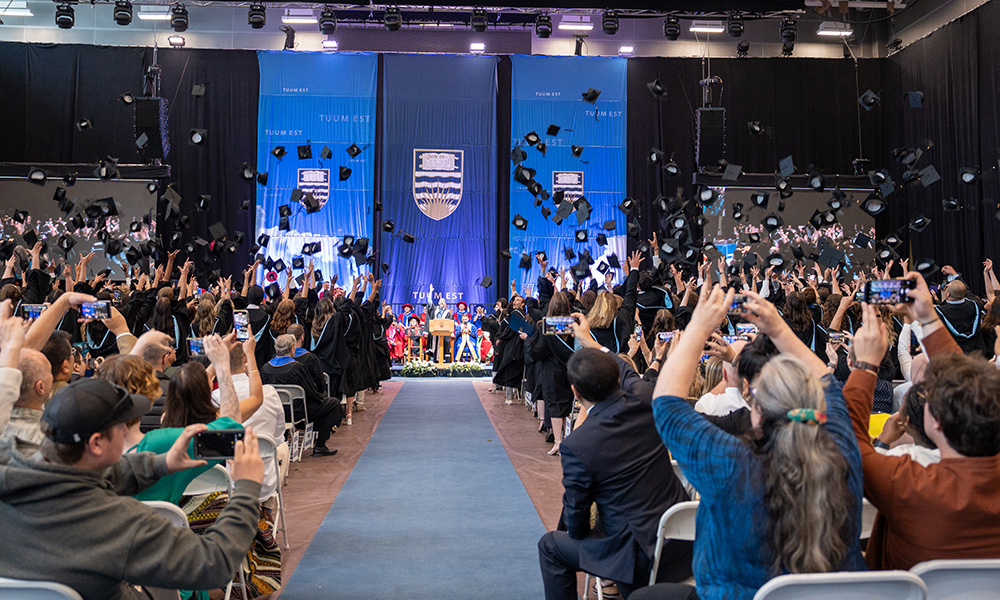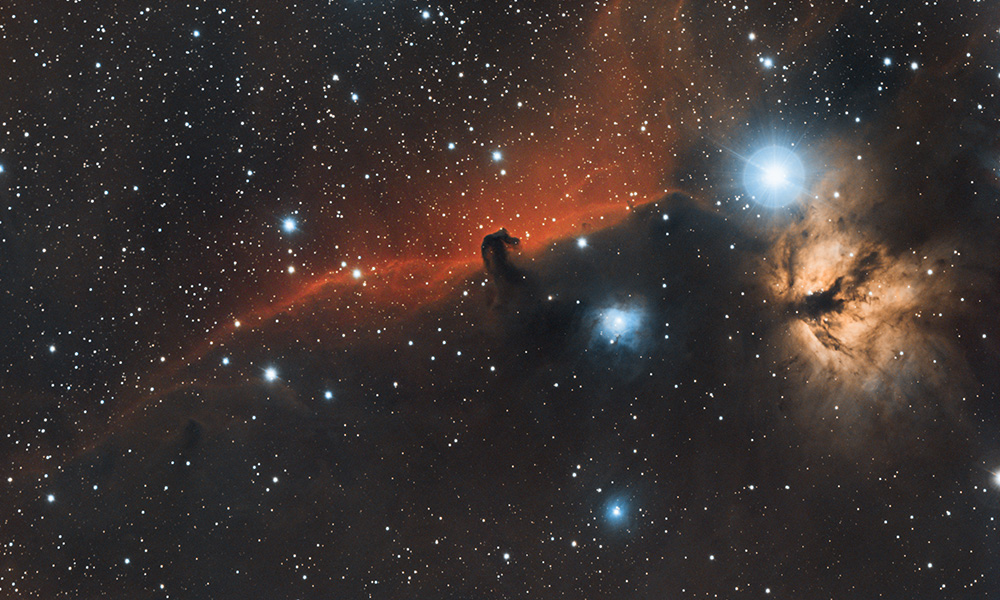
Rebecca Booth, Dr. Anna Ordog and Dr. Alex Hill with the DRAO 15m telescope behind them. Photo courtesy of the National Research Council of Canada/Conseil National de Recherches Canada.
A UBC Okanagan-led research project has given a group of international scientists their clearest view yet of the Milky Way’s magnetic field, revealing that it is far more complex than previously believed.
Dr. Alex Hill, Assistant Professor in the Irving K. Barber Faculty of Science at UBCO, specializes in radio astronomy. Working at the Dominion Radio Astrophysical Observatory (DRAO), near Penticton, his team used data from the DRAO 15-metre telescope to complete the first broadband map of Faraday rotation, a phenomenon that scientists use to track magnetic fields across the northern sky.
The dataset, known as Dominion Radio Astrophysical Observatory GMIMS of the northern sky (DRAGONS) and led by former UBCO postdoctoral researcher Dr. Anna Ordog, captures polarized radio emissions across a wide range of frequencies, allowing astronomers to see magnetic structures that were previously invisible. This research is part of a larger initiative called the Global Magneto-Ionic Medium Survey (GMIMS), initiated by Dr. Tom Landecker, an astronomer at DRAO and adjunct professor at both UBCO and the University of Calgary.
“With our new dataset, we can look at the polarized emissions from within the galaxy itself, and we see that the magnetic field has a lot of structure to it,” Dr. Ordog explains. “DRAGONS is the first to show this level of complexity on such large spatial scales and across the entire northern sky.”
The work builds on a theoretical insight first proposed in 1966, which showed that polarized radio waves observed at many frequencies enable measurements of the three-dimensional structure of the Milky Way’s magnetic field. At the time, the technology needed to observe this effect across wide frequency ranges did not exist. Modern broadband telescopes, including the DRAO 15m telescope, have made this research possible.
The project was the first scientific use of the 15m telescope, which DRAO originally built as a prototype antenna for the SKA—a large radio telescope currently under construction in Southern Africa and Western Australia. Dr. Ordog led the setup for the DRAGONS project, supported by five students from UBCO and the University of Calgary, along with the expertise of DRAO engineers and technologists.
“The 15m is the ideal instrument for this all-sky survey of large-scale magnetized structures—it can scan rapidly, effectively ‘painting’ a map of the polarized sky in just six months,” she says. “Having the 15m so close to UBCO allowed students to contribute to hands-on testing in preparation for the survey.”
UBCO students analyzed “first light” signals from the instrument, developed algorithms to identify human-made radio interference and assessed the survey data quality.
The study, recently published in The Astrophysical Journal Supplement Series, tracks how polarized radio waves twist as they travel through the galaxy, revealing the strength, structure and direction of magnetic fields along the line of sight. This survey shows that more than half the sky contains complex magnetic structures rather than simple, uniform fields.
Dr. Landecker says the biggest surprise for the researchers was just how much of the sky is what is known as “Faraday complex”.
“With our new dataset, we can look at the polarized emission from within the galaxy itself, and we can see that the magnetic field has much more structure to it than we could detect with earlier observation methods,” says Dr. Landecker, who is also the leader of a larger effort to map magnetic fields in three dimensions and an astronomer emeritus at DRAO.
“DRAGONS is like a compass, telling us how matter and magnetic fields in the galaxy are organized and how the magnetic field interacts with bubbles created by supernova explosions, spiral arms and other parts of the galaxy in ways that have never been possible before.”
Magnetic fields shape how stars are formed and how galaxies evolve, explains Dr. Hill.
“For decades, we could only measure the Milky Way’s magnetic field in a very averaged, simplified way,” says Dr. Hill. “But its magnetic field is an important piece of the puzzle when it comes to understanding how the universe and everything in it operates and came into being.”
Already, the DRAGONS data have been used in a study of the mysterious large-scale reversal in the galactic magnetic field. This latest study was led by University of Calgary doctoral student Rebecca Booth and published in an accompanying paper in The Astrophysical Journal this week. This is a good example of how the dataset will provide opportunities for continued research in this field, says Dr. Ordog.
“DRAGONS is part of a new generation of radio surveys that allow scientists to map the Milky Way’s three-dimensional magnetic field structure in the space between the stars,” she adds. “It is an important Canadian contribution to the global astronomical community.”

The DRAO 15m telescope at work scanning the sky for the DRAGONS survey. The data collected by this survey is a new generation of radio surveys that allow scientists to continue mapping the Milky Way and its three-dimensional magnetic field structure. Photo courtesy of Luca Galler.
The post New map of the Milky Way’s magnetism offers insights into cosmic evolution appeared first on UBC's Okanagan News.






